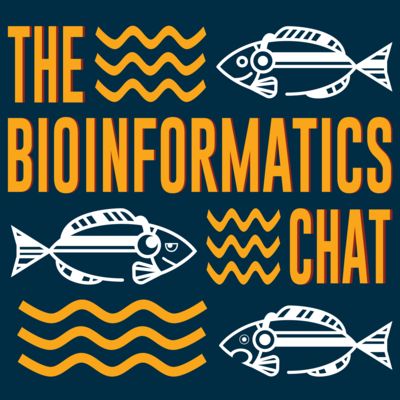A podcast about computational biology, bioinformatics, and next generation sequencing.
https://bioinformatics.chat
Gesamtlänge aller Episoden: 3 days 1 hour 46 minutes
episode 60: Differential gene expression and DESeq2 with Michael Love
In this episode, Michael Love joins us to talk about the differential gene expression analysis from bulk RNA-Seq data.
We talk about the history of Mike’s own differential expression package, DESeq2, as well as other packages in this space, like edgeR and limma, and the theory they are based upon. Mike also shares his experience of being the author and maintainer of a popular bioninformatics package...
episode 59: Proteomics calibration with Lindsay Pino
In this episode, Lindsay Pino discusses the challenges of making quantitative measurements in the field of proteomics. Specifically, she discusses the difficulties of comparing measurements across different samples, potentially acquired in different labs, as well as a method she has developed recently for calibrating these measurements without the need for expensive reagents...
episode 58: B cell maturation and class switching with Hamish King
In this episode, we learn about B cell maturation and class switching from Hamish King. Hamish recently published a paper on this subject in Science Immunology, where he and his coauthors analyzed gene expression and antibody repertoire data from human tonsils...
episode 57: Enhancers with Molly Gasperini
In this episode, Jacob Schreiber interviews Molly Gasperini about enhancer elements. They begin their discussion by talking about Octant Bio, and then dive into the surprisingly difficult task of defining enhancers and determining the mechanisms that enable them to regulate gene expression.
Links:
- Octant Bio
- Towards a comprehensive catalogue of validated and target-linked human enhancers (Molly Gasperini, Jacob M...
episode 56: Polygenic risk scores in admixed populations with Bárbara Bitarello
Polygenic risk scores (PRS) rely on the genome-wide association studies (GWAS) to predict the phenotype based on the genotype. However, the prediction accuracy suffers when GWAS from one population are used to calculate PRS within a different population, which is a problem because the majority of the GWAS are done on cohorts of European ancestry.
In this episode, Bárbara Bitarello helps us understand how PRS work and why they don’t transfer well across populations...
episode 55: Phylogenetics and the likelihood gradient with Xiang Ji
In this episode, we chat about phylogenetics with Xiang Ji. We start with a general introduction to the field and then go deeper into the likelihood-based methods (maximum likelihood and Bayesian inference). In particular, we talk about the different ways to calculate the likelihood gradient, including a linear-time exact gradient algorithm recently published by Xiang and his colleagues...
episode 54: Seeding methods for read alignment with Markus Schmidt
In this episode, Markus Schmidt explains how seeding in read alignment works. We define and compare k-mers, minimizers, MEMs, SMEMs, and maximal spanning seeds. Markus also presents his recent work on computing variable-sized seeds (MEMs, SMEMs, and maximal spanning seeds) from fixed-sized seeds (k-mers and minimizers) and his Modular Aligner...
episode 53: Real-time quantitative proteomics with Devin Schweppe
In this episode, Jacob Schreiber interviews Devin Schweppe about the analysis of mass spectrometry data in the field of proteomics. They begin by delving into the different types of mass spectrometry methods, including MS1, MS2, and, MS3, and the reasons for using each...
episode 52: How 23andMe finds identical-by-descent segments with William Freyman
In this episode, Will Freyman talks about identity-by-descent (IBD): how it’s used at 23andMe, and how the templated positional Burrows-Wheeler transform can find IBD segments in the presence of genotyping and phasing errors.
Links:
- Fast and robust identity-by-descent inference with the templated positional Burrows-Wheeler transform (William A. Freyman, Kimberly F. McManus, Suyash S. Shringarpure, Ethan M...
episode 51: Basset and Basenji with David Kelley
In this episode, Jacob Schreiber interviews David Kelley about machine learning models that can yield insight into the consequences of mutations on the genome. They begin their discussion by talking about Calico Labs, and then delve into a series of papers that David has written about using models, named Basset and Basenji, that connect genome sequence to functional activity and so can be used to quantify the effect of any mutation...
